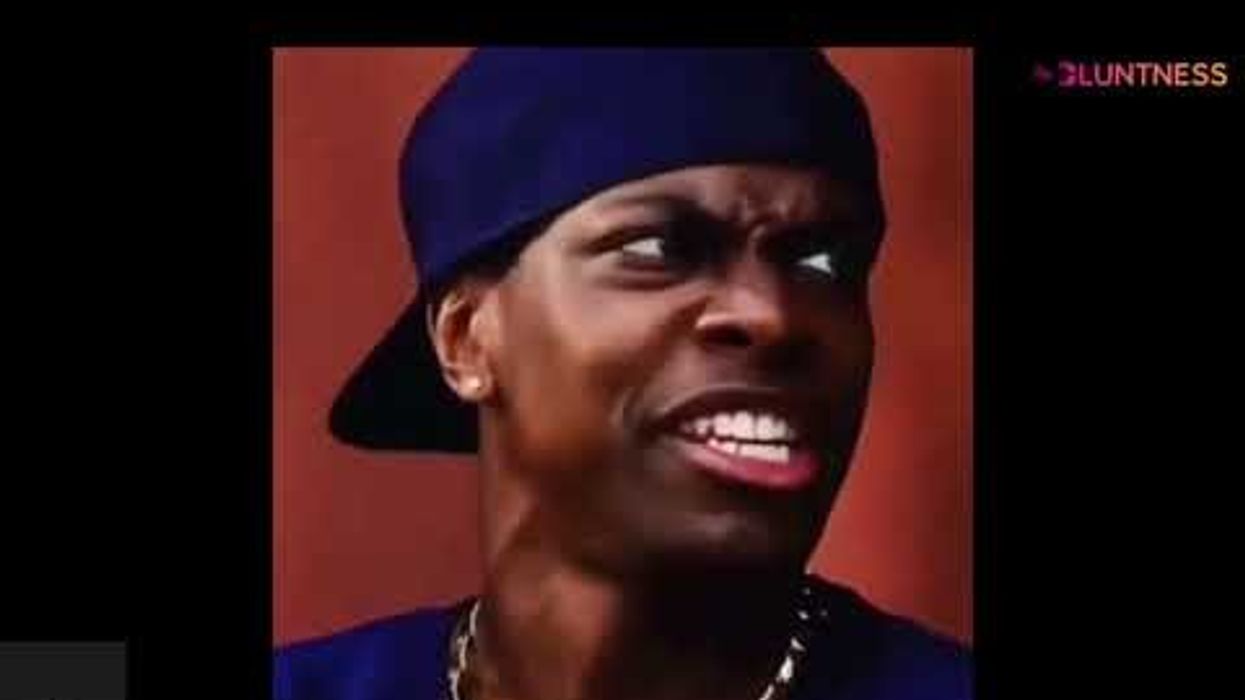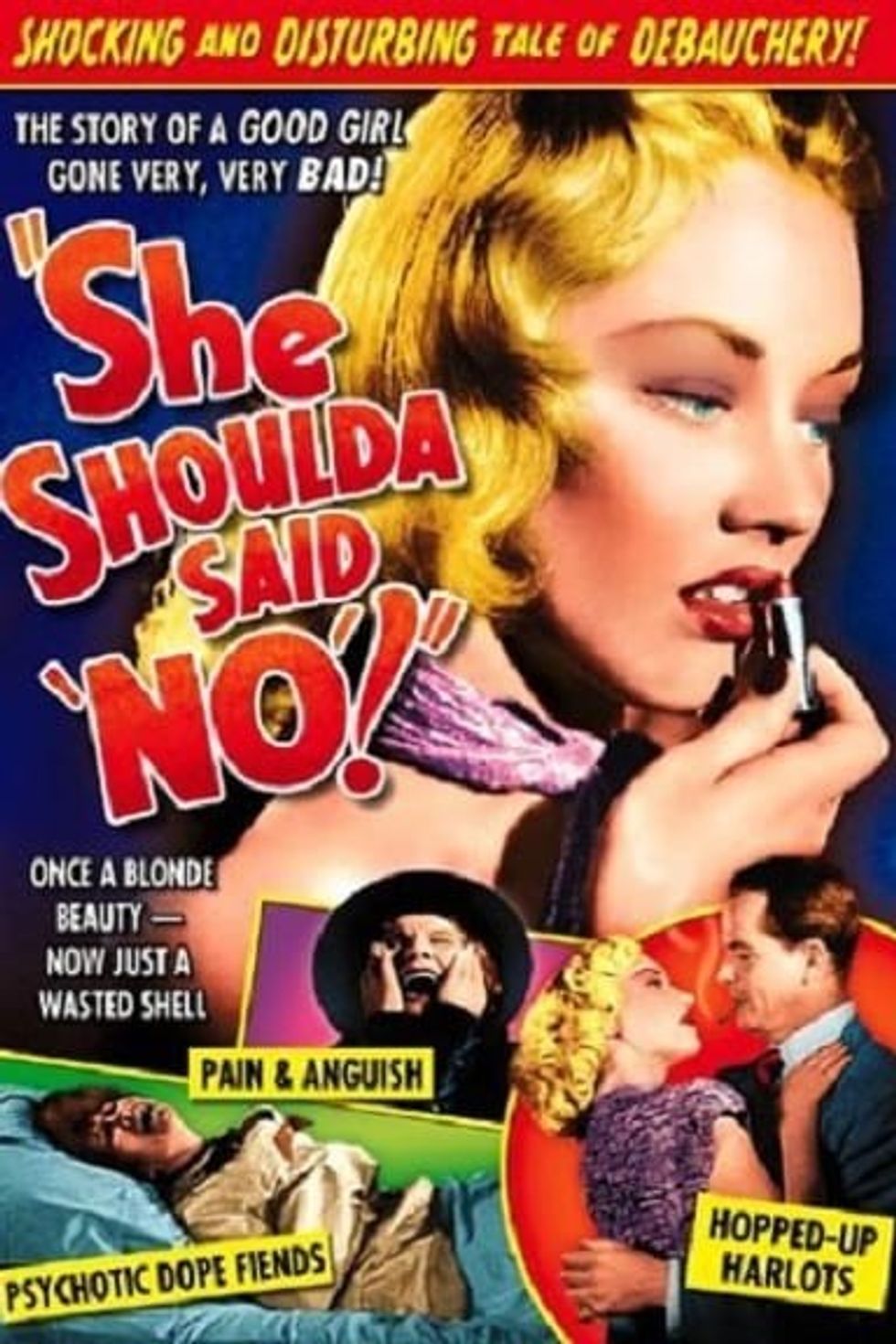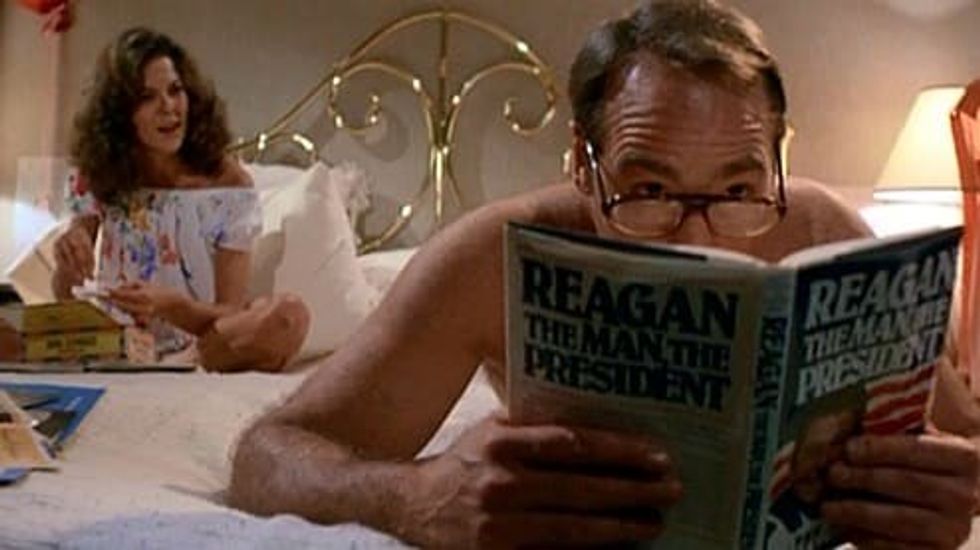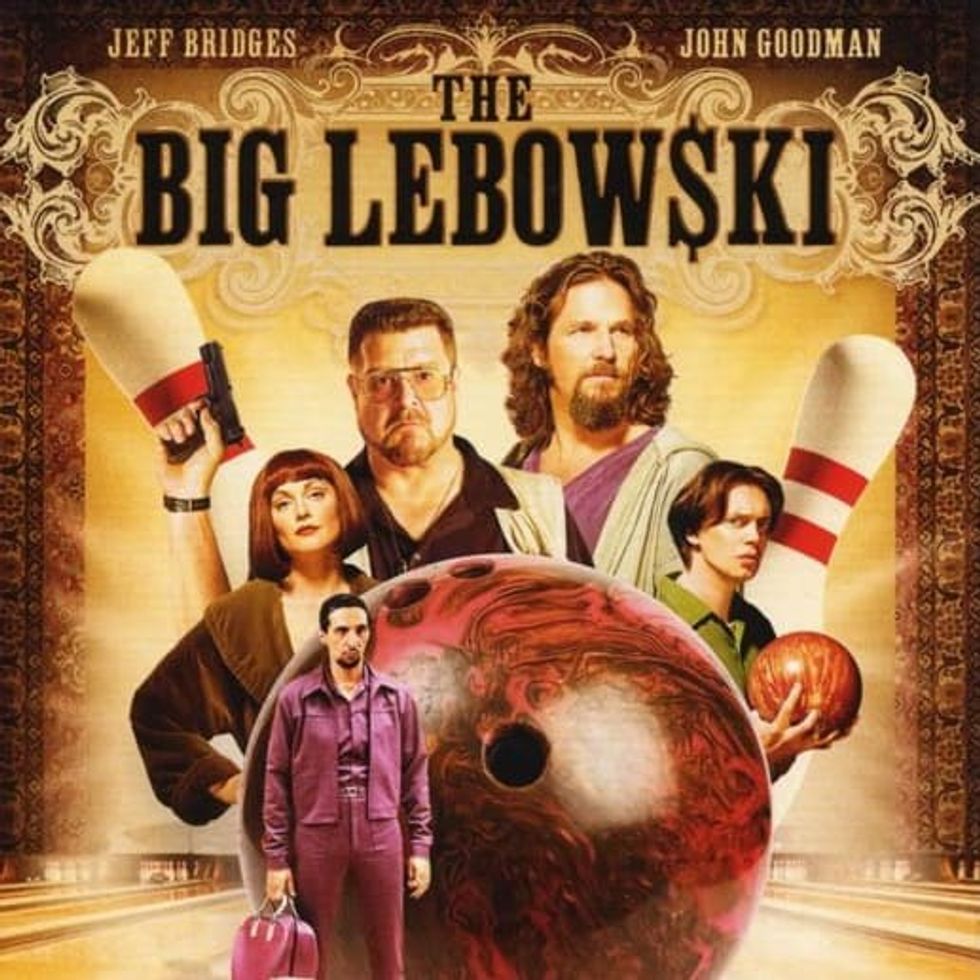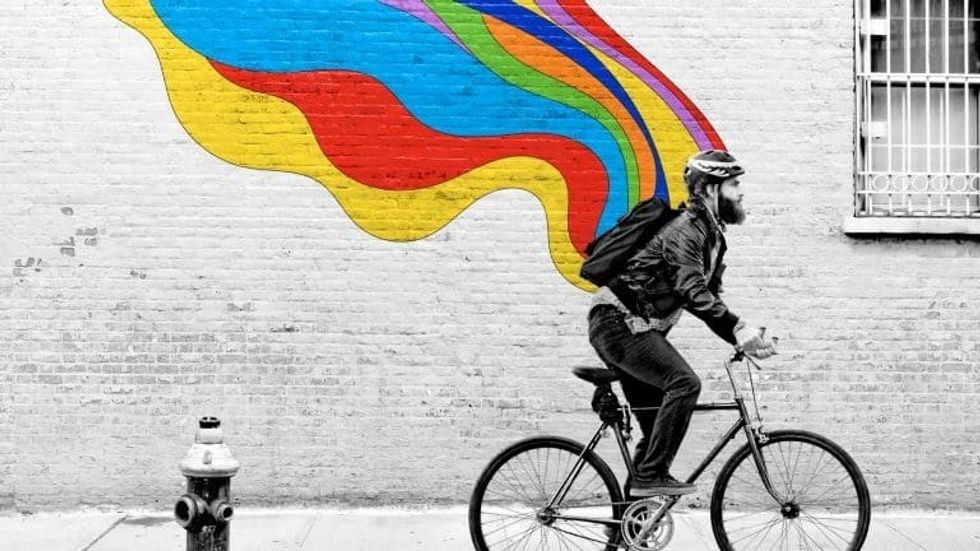The Evolution Of The Classic Stoner Character in Movies and TV
It’s taken TV and movies featuring stoner characters a long time to catch up with the reality of marijuana culture in the United States. Historically, Hollywood has ignored cannabis all together, then demonized it, misrepresented it, and used it as an easy punchline, before finally giving way to the more nuanced, low-key reality of life in a country where over half its states have legalized the drug for medical or recreational use.
Here, The Bluntness charts the changing depiction of marijuana users in film and TV over the last 85 years or so, and digs in to what these stoner movies might tell us about the changing cultural attitudes around pot in pop culture.
Ralph Wiley - Reefer Madness (1936)
“Marihuana, the burning weed with its roots in Hell!”, from the movie poster for the 1936 film "Reefer Madness"
Sponsored by a church group as a morality play and originally titled "Tell Your Children," the 1936 movie Reefer Madness is patently ridiculous. It’s now considered a camp classic and one of the worst movies ever made for its depiction of pot-fueled depravity that was hysterical, in both senses of the word.
College dropout, turned dope dealer Ralph Wiley (actor Dave O’Brien, chewing the scenery) is a menace to society, corrupting local youth with amoral glee and facilitating manslaughter, before finally losing his mind to the devil’s weed.
This sensationalized portrayal of the stoner movie held strong for another 30 years, give or take, as the driving force of many a low budget exploitation flick. Notable among them is 1949’s She Shoulda Said No!, a cheap cash-in on lead actress Lia Leeds’ brush with the law after smoking up with Robert Mitchum, who’s own career wasn’t significantly impacted. He didn’t have to star in this clunker, for one.
While it is easy to dismiss these stoner movies as poorly produced, ludicrous "film making" of a misinformed, bygone era, their harm is much deeper. In fact, these films, and many more like them, were used demonize marijuana as a drug of promiscuity and vice, as well as reinforce racial and ethnic bigotries that even extended to the music of the day. These prejudices remain fodder for conservative resistance to decriminalization and legalization, with some being used by a former presidential candidate descending an escalator to announce his candidacy.
Hollywood's perception of the deviant, amoral movie stoner would last for decades.
Wyatt & Billy - Easy Rider (1969)
Towards the end of a pivotal decade for cannabis culture, Hollywood finally produced a tweaked depiction of the stoner character that nudged Peter Fonda and Dennis Hopper’s portrayals down from public enemies to flawed anti-heroes. The lingering outlaw element in this counterculture classic should not be undersold. It’s easy to forget that the main plot of Easy Rider is a couple of bikers trying to smuggle a bunch of cocaine. But it’s notable for at least a somewhat measured attitude towards weed. The scene where the boys get Jack Nicholson’s lawyer high for the first time, while gently disabusing him of some common cannabis misconceptions, is especially significant.
Anthony “Man” Stoner & Pedro de Pacas - Up In Smoke (1978)
Cheech and Chong were the first comedians to make cannabis central to their act, and the first to turn a stoner movie into a Hollywood smash. As the first of many cannabis movies the duo made in the 70s and 80s, Up In Smoke made $44 million dollars with a budget of only $2 million, establishing pot comedies as a potent commercial force.
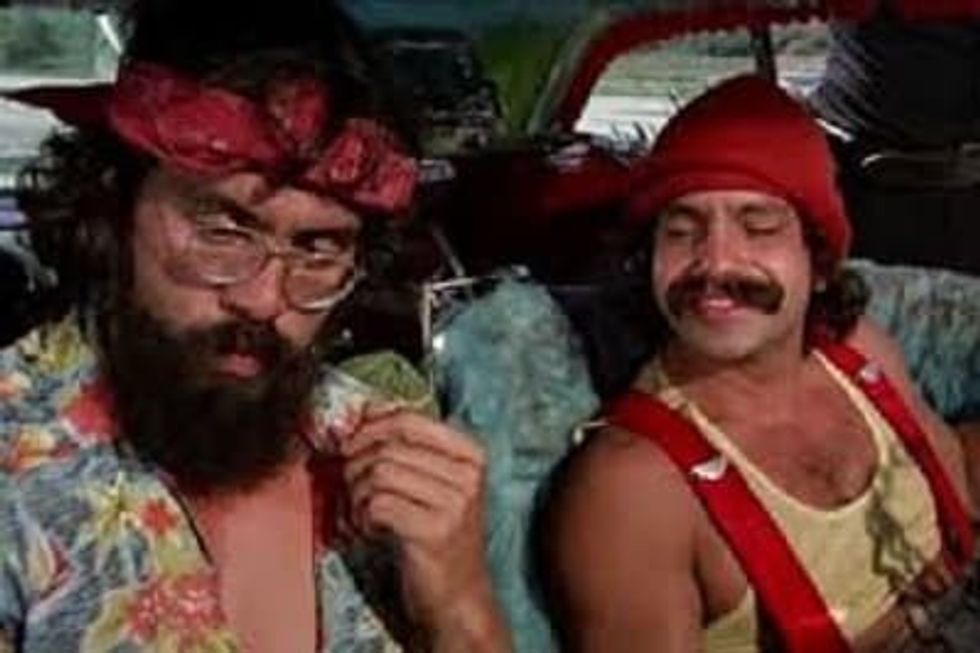
On the one hand, the movie established cannabis stereotypes that responsible pot smokers still struggle against today. On the other, it represented a sea change from the hyperbole of the ReeferMadness era, downgrading a joint from a life-ruiner to a bit of dumb, giggly fun. Over forty years later, their names are still a recognizable shorthand for overconsumption, while Cheech and Chong’s status as cannabis culture icons is set forever.
Steve & Diane Freeling - Poltergeist (1982)
You wouldn’t expect the most normal portrayal of cannabis use in all of the “Just Say No!” era of 1980s cinema to come in a midst of a Tobe Hooper’s Stephen Spielberg-produced horror hit. And yet, the nonchalant way suburban parents Steve and Diane Freeling (Craig T. Nelson & JoBeth Williams) share an evening joint after the kids have gone to bed was a subtle watershed. Sure, they are menaced by vengeful ghosts shortly thereafter, but it’s not presented as a symbolic punishment for the moral crime of smoking pot.
The Reagan biography Steve is reading—signifying a generational creep from flower child to unabashed capitalist—is more relevant to their ghouls’ main gripe.
Slater - Dazed & Confused (1993)
Weed is omnipresent in Richard Linklater’s nostalgic fantasia of the 1970s, with football players, top students, hoodlums, dorks, and burnouts all blazing together. Rory Cochrane’s Slater, is the prototypical stoner among stoners, but still a slight tweak on the stereotypes leftover from the era Dazed & Confused depicts.
Whereas Jeff Spicoli flunked out of class due to massive bong rips in Fast Times at Ridgemont High, Slater’s comic relief comes as much from his grasp of historical trivia as his heavy lids. Most memorable is his speech on George Washington’s hemp farming, and his “hip, hip” first lady, Martha, which earns extra points for acknowledging that a little weed smoking was not an invention of the 1960s.
Craig & Smokey - Friday (1995)
By the mid-90s, the dominant imagery of the stoner movie character had shifted from Woodstock flower child nostalgia to an ever-present cloud perpetually hanging in the background of rap videos. Chris Tucker and Ice Cube’s characters in the 1995 comedy hit Friday weren’t so far off from the sort of lovable schemers Cheech and Chong would have played in the 70s.
The music, the fashion, humor, and sensibility of Friday was uniquely forged by hip-hop, and the sensibility of director F. Gary Gray, making his film debut after years of dominating MTV with his clips for weed-positive artists like Cypress Hill, Dr. Dre, Outkast, and his film’s star Ice Cube. Gray would go on to helm many a Hollywood blockbuster including the shoulda-been-nominated for-an OscarNWA biopic "Straight Outta Compton."
On a side note, Friday is the movie that made the phrase "Bye Felicia" part of the American lexicon. Also, many of today's rappers and athletes, who have taken their fame and fortune into the cannabis industry, have mentioned Friday as an inspiration.
Jeffrey “The Dude” Lebowski - The Big Lebowski (1998)
The iconic burned out Boomer in winter. The Coen Brothers had great fun placing a perpetually weed-fogged protagonist at the center of a rather hard to follow mystery. Jeff Bridges’ slacker sleuth belongs to another time, which is kind of the point. The 60s are well over, and as the film’s other Jeffrey Lebowski puts it, “The bums lost.”
But there’s an elegiac quality to watching a gracefully aged beach bum navigate a more complicated 90s world. It’s a long goodbye to an era and an archetype stoner movie character that clears the decks for further reinvention.
Dale Denton - Pineapple Express (2008)
The films made in the 2000s by producer / director Judd Apatow and frequent star and collaborator Seth Rogen claimed the mantle of pot culture from the Boomers, puffing and passing the torch to a new generation once and for all. While pot is very present in their TV series Freaks and Geeks, as well as film hits like The 40-Year Old Virgin and Knocked Up, it’s central to the plot of PineappleExpress, an action comedy that takes its name from a particularly potent weed strain (a real one!). Rogen’s character Dale may not have his life completely together, but he is a gainfully employed white collar worker, which had not been the norm among pot smokers on film.
It’s also a fun time capsule representation of the pseudo-friend relationship that many people had to affect with their dealers, a dynamic that seems soon to be extinct in the professionalized legal cannabis industry.
Abbi & Ilana - Broad City (2014)
With respect to Anna Farris, whose under-seen female stoner movie Smiley Face preceded it by seven years, it’s Comedy Central’s Broad City series that’s made the biggest impact in gender parity for pothead pop culture. Abbi Jacobsen and Ilana Glazer’s searching 20-somethings are given the freedom to toke up and mess up as freely as all the male bud buddies that preceded them. Far from the fallen women tropes of the few actresses who partook in Golden Age exploitation films, Abbi and Ilana are fun-loving and self-possessed heroines who happen to get hella high.
The Guy - High Maintenance (2016)
Full normalization at last. A decade earlier, Showtime’s Weeds’ creation of a drug dealer who happened to be a suburban mom was treated as a break-through for the changing face of pot. But that show digressed so quickly into over-the-top soap operatic peril that any real points it might make about America's stoner persona in the 21st Century were hopelessly muddied.
“The Guy,” the sweet-natured New York City weed delivery man at the center of HBO’s HighMaintenance sees plenty of weird stuff on his route. But that has to do with the broad swath of everyday city-dwellers who want to partake of his services and not the technically illegal way he makes a buck.
Want More?Sign Up For The Bluntness Newsletter To Keep Up With the Latest Cannabis News.
